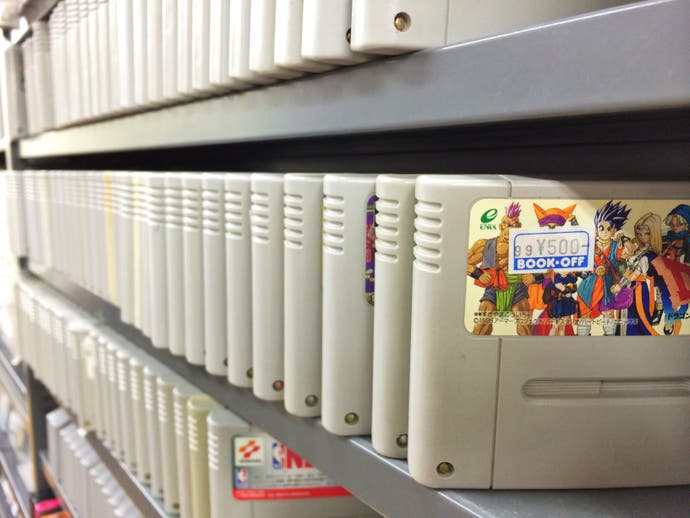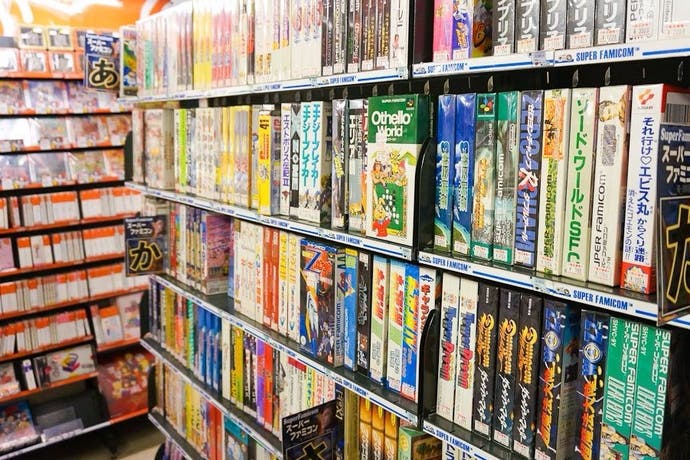What happened to Japan's once bountiful vintage game stores?
Akihabara plundered.
Everyone remembers their first visit to Super Potato. Squished in a higgledy side-street, a plushie's throw from Akihabara station in eastern Tokyo, you climb a cramped staircase, past a parade of blue-tac'ed posters, into a cosy, glittering Aladdin's den of video games past. The shelves are as packed as the real estate outside. Towers of Famicoms, MegaDrives, PC Engines sway in the corner, while amongst the orderly phalanxes of game spines, desirable specimens sit, turned outwards, attracting customers with colourful plumes of artwork. In glass cabinets, the prohibitively expensive, or the prohibited from sale: Super Famicom review cartridges; an early Neo Geo system, sold exclusively to Japanese hotels; a Radiant Silvergun, the 1998 air - air from a time when its developer, Treasure, was still a going concern - still shrink-wrapped inside. One of Miyamoto's fingers is probably back there somewhere, propped up against the expensive plastic, wrapped in muslin, brought out on nationals holidays, or Zelda's birthday.
Places like this don't exist in Britain - at least, not on this scale, or with this kind of density of stuff (the gigantic Dreamcast pillow, plump under the counter; the Mother scarf draped around the life-sized Solid Snake statue; the GameCube book-ends). Our vintage game stores are almost all gone (the basement of Computer Exchange in Rathbone Place, London, once littered with exotic desirables, has been a DVD dumping ground for years). The National Videogame Arcade in Nottingham has a few dozen eccentricities on show -- a copy of a sand-dusted E.T. for the Atari 2600, a Lara Croft Lucozade bottle, a pair of Samba de Amigo maracas -- but there's no place you can go to run your eyes along the spines of a row of games and, in doing so, catch the grand sweep of the medium's history. There's precious little chance of being blindsided by an unexpected memory - your secret crush age 12; your favourite teacher age 15; the memory of your parents, together - when you spot an old flame on a shelf.
Super Potato is just one of half-a-dozen vintage game stores in Electric Town's mile-or-so stretch. It's the most famous not just because of its percussive, lumpy name, but also because, for a long while, it was the only establishment that allowed visitors to take photographs and videos inside. During the past ten years, as Super Potato's fame has grown, its effect on first-time visitors has remained undiminished. The prices, however, have steadily risen, while the clientele has changed and the stock has depleted. Super Potato is now a tourist attraction; far more foreigners than Japanese squeeze apologetically through its narrow aisles. This is true, in fact, for most of Tokyo's vintage game stores, from Mandarake, a chain of second hand geek stores, with a headquarters in a shopping centre in Nakano (a kind of Bluewater for recluses) through to Friends, the most un-plundered of the bunch, situated above Suehirocho station, where every day an elderly lady hunches behind a counter, placing cartridges into plastic wrappers with creaky fingers.

The influx of foreigners has had more than a diversifying effect on Tokyo's vintage game stores. Last year, Wired's Chris Kohler posted a photograph onto social media showing the shelf where Super Potato's PC Engine games once lived. It looked like the scene of a recent looting; only a clattering of discs remained. "Akihabara is being scoured clean," he wrote. A year later, I popped my head inside to find that the shelves have been restocked, but the prices have risen precipitously, presumably to ensure there's still something around to sell to the waves of cooing customers. Throughout Tokyo, the cost of sought-after vintage games has risen to match those found on eBay, the place where, for years, savvy Westerners would sell the games they found in Japan with a fat mark-up.
The reasons behind the rise in prices and the decline in stocks are myriad and not limited to Japan (a boxed English copy of Super Metroid will easily set you back £150). Video games are more prone than other media to obsolescence. With each new generation of hardware, scores of titles are made unplayable. Re-releases, meanwhile, are limited to a handful of well-known classics. To play the curios, of which there are thousands, you have to buy original. Demand rises as people grow older and want, like every generation before them, to buy back their childhood. For others it's a way to resist the great tidal shift from physical to digital media. Downloadable games offer convenience, but rob us of the joy of physicality. (M2's forthcoming re-release of the hugely sought after shoot 'em up Battle Garegga, for example, is being sold in a lavish box set but with only a download code inside). Rather than undercutting the demand for physical copies of these games, digital re-releases seem to have the opposite effect. Newcomers fall in love, then hunt down the original versions, a memento for the shelf, a reminder of the joys inside, and more generally of their passions and taste.
When YouTubers introduce younger audiences to rare, quality vintage games that haven't been ported to current machines, capitalism's equation proves simple and unwaveringly dependable: scarcity plus demand equals expense. Now, into this mix come the math-wrangling speculators, those looking to buy up copies of desirable games, hold onto them to increase scarcity and in doing so drive up the price. Meanwhile, Japan's stock of vintage games is not being replenished. eBay sellers such as YamaToku Classic have industrialised the export of vintage Japanese video games, with thousands of items perpetually flowing through its online store then out of the country, by plane, train or automobile. The big city stores -- Super Potato has two premises in Tokyo and one in Osaka -- meanwhile, suck up stock from rural Japan, taken from local shops, Book-Offs (second hand book stores that also sell second hand games), or pilfered from Yahoo Auctions. In 2016 it is still possible to tour Tokyo's vintage game stores and, with a little persistence and a basic knowledge of the Japanese alphabets, find whatever you're looking for. But the experience comes at a price, and, increasingly, with a looming deadline.

